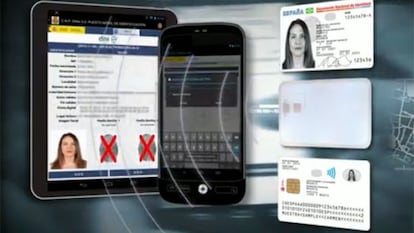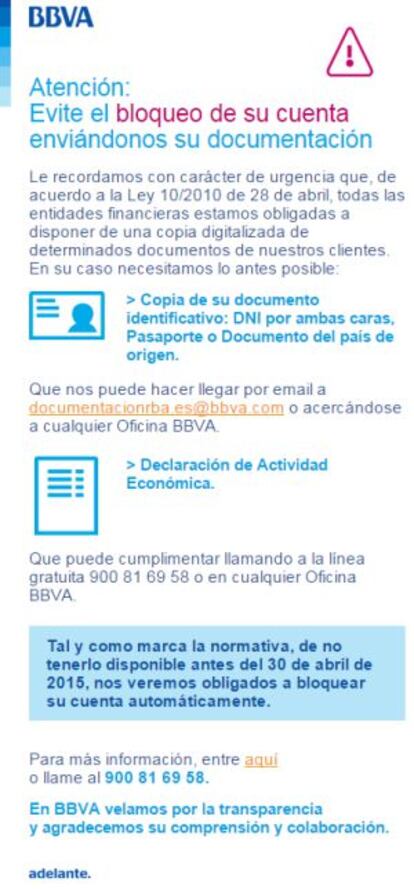Why your bank account may be blocked if you don’t hand in your ID
Looming deadline for lenders to digitalize clients’ personal data could spell trouble

“My office looks like a doctor’s practice,” complained a bank manager last week, in reference to the lines of people waiting to inquire about a new ID requirement.
April 30 marks the deadline for banks to collect and digitalize up-to-date identification documents for all account holders, as per existing legislation. For Spaniards, this means the DNI national identity card; for foreign residents, their residency card or passport.
The problem could arise if the contact information in the lender’s power is outdated and the client cannot be reached with the request for new data
In some cases, clients will also be asked for information regarding their economic activities, as part of new requirements to combat money laundering and the financing of terrorism.
While the obligation to keep digital records of clients’ personal data was introduced in 2010, the law gave lenders a five-year deadline to complete the task.

“We’re all prone to leaving things until the last minute,” confesses José María Roldán, president of the Spanish Banking Association (AEB), adding that the sector is now working around the clock to meet the deadline.
At this point, clients who have not yet been contacted by their bank – the latter has the obligation to do so – can assume that no further action is necessary and that their ID is already in the bank’s possession.
The problem could arise if the contact information in the lender’s power – address, email, telephone number – is outdated and the client cannot be reached with the request for new data.
Accounts that do not meet the requirements will be blocked on May 1.
“Obviously, when the client turns in their ID, the account will be activated again,” explains a bank worker.
But after three months, these blocked accounts will be transferred to a different category known as “cuentas de orden;” recovering one’s money at that point could be more complicated and require additional paperwork.
Some sources talk about more than five million clients without an up-to-date ID document, although banking associations refute this figure.
Obviously, when the clients turn in their ID, the accounts will be activated again”
There are an estimated 70 million bank accounts in Spain, of which 50 million are held by private individuals. The sheer volume of paperwork involved has forced some lenders to hire external firms to help them deal with it.
Financial companies such as the one that handles credit cards for the El Corte Inglés department store are also under the same legal obligation, and have offered clients numerous ways to provide the necessary information.
For these companies, the issue is critical, because their clients pay with cards that will get blocked on May 1 if no digital ID records exist.
A few months ago, the banking sector applied for a deadline extension, but it was denied. The Economy Ministry notes that “lenders had the obligation to collect and conserve copies of their clients’ ID since 1993. The 2010 law expressly established that electronic records had to be kept to avoid documents getting misplaced. In 2010, entities were given a five-year period to obtain that digitalized information.”
The problem is particularly intense at lenders that have undergone mergers in recent years, leading to the transfer of documents and closure of branch offices, or even of entire banks.
Tu suscripción se está usando en otro dispositivo
¿Quieres añadir otro usuario a tu suscripción?
Si continúas leyendo en este dispositivo, no se podrá leer en el otro.
FlechaTu suscripción se está usando en otro dispositivo y solo puedes acceder a EL PAÍS desde un dispositivo a la vez.
Si quieres compartir tu cuenta, cambia tu suscripción a la modalidad Premium, así podrás añadir otro usuario. Cada uno accederá con su propia cuenta de email, lo que os permitirá personalizar vuestra experiencia en EL PAÍS.
¿Tienes una suscripción de empresa? Accede aquí para contratar más cuentas.
En el caso de no saber quién está usando tu cuenta, te recomendamos cambiar tu contraseña aquí.
Si decides continuar compartiendo tu cuenta, este mensaje se mostrará en tu dispositivo y en el de la otra persona que está usando tu cuenta de forma indefinida, afectando a tu experiencia de lectura. Puedes consultar aquí los términos y condiciones de la suscripción digital.









































